Letter of Advice: Migration Law and Exceptional Circumstances Analysis
VerifiedAdded on 2022/11/16
|6
|1623
|195
Report
AI Summary
This document is a detailed letter of advice concerning Australian migration law, focusing on the concept of 'exceptional circumstances' in relation to visa extensions. It provides an analysis of the legal requirements and interpretations, referencing the Migration Regulations of 1994 and the Migration Act of 1958. The letter explores the meaning of exceptional circumstances, highlighting the importance of circumstances beyond the applicant's control. It references key cases, including Yassa, An v Minister for Immigration and Citizenship, Wang v Minister of Immigration and Multicultural and Indigenous Affairs, and Hatcher v Cohn, to illustrate how the Administrative Appeals Tribunal and the courts interpret and apply the law. The advice emphasizes the need for credible evidence and compliance with specific visa categories, such as Subclass 600, and explains the role of the Procedures Advice Manual in defining exceptional circumstances. The letter concludes by outlining the factors considered in determining whether an applicant's situation warrants an extension of stay in Australia, taking into account the principles of natural justice and the specific criteria outlined in the relevant legislation.
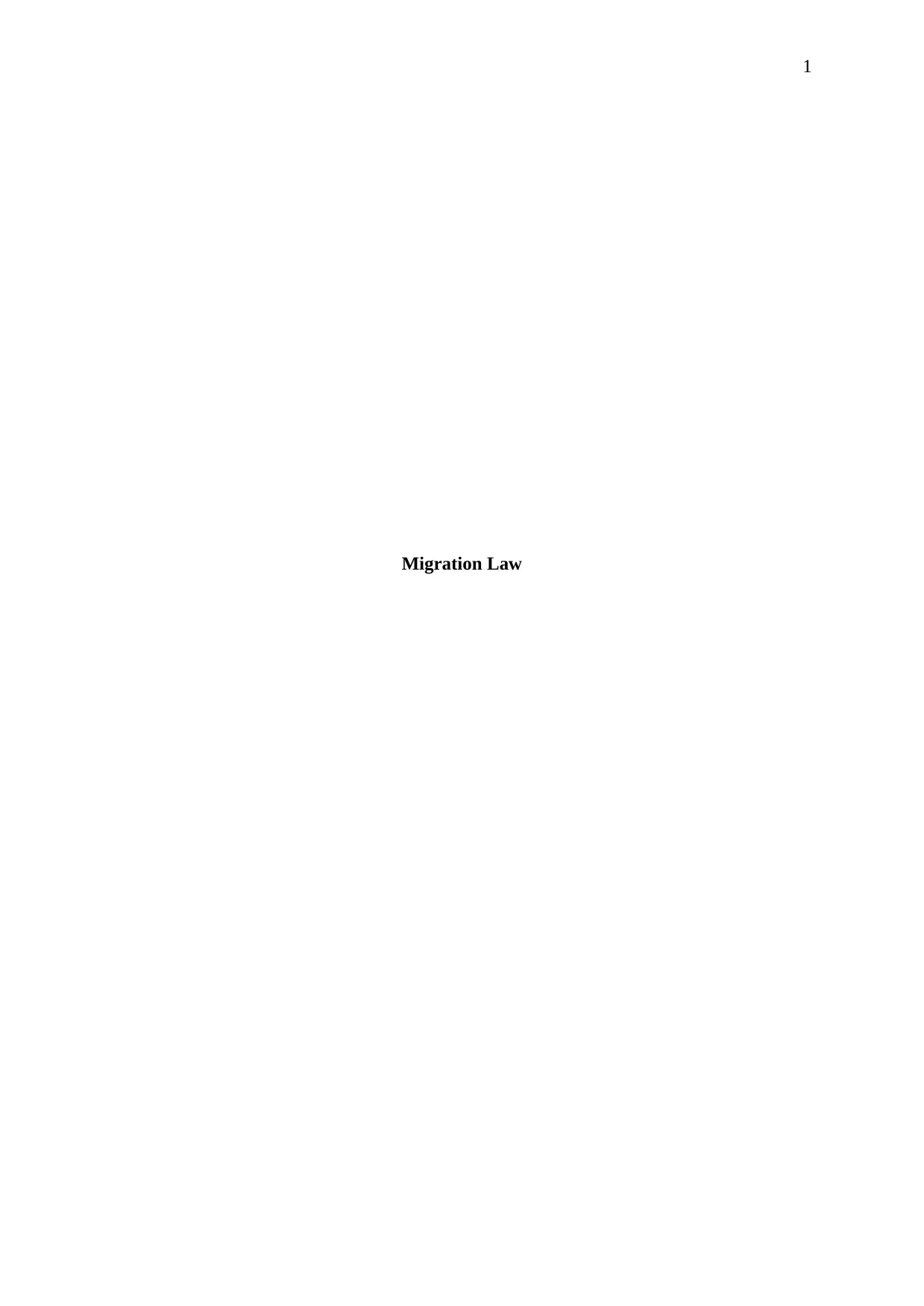
1
Migration Law
Migration Law
Paraphrase This Document
Need a fresh take? Get an instant paraphrase of this document with our AI Paraphraser
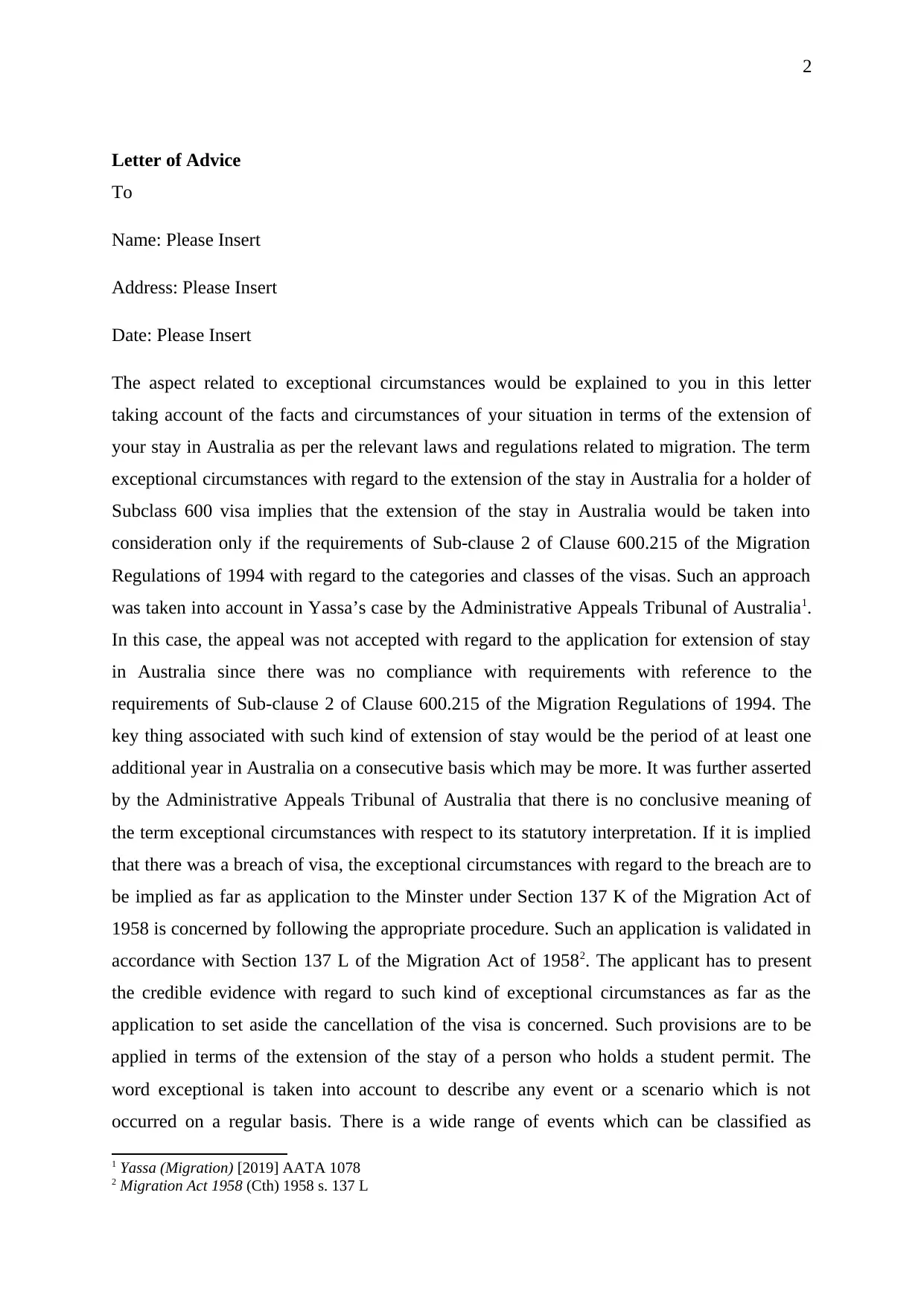
2
Letter of Advice
To
Name: Please Insert
Address: Please Insert
Date: Please Insert
The aspect related to exceptional circumstances would be explained to you in this letter
taking account of the facts and circumstances of your situation in terms of the extension of
your stay in Australia as per the relevant laws and regulations related to migration. The term
exceptional circumstances with regard to the extension of the stay in Australia for a holder of
Subclass 600 visa implies that the extension of the stay in Australia would be taken into
consideration only if the requirements of Sub-clause 2 of Clause 600.215 of the Migration
Regulations of 1994 with regard to the categories and classes of the visas. Such an approach
was taken into account in Yassa’s case by the Administrative Appeals Tribunal of Australia1.
In this case, the appeal was not accepted with regard to the application for extension of stay
in Australia since there was no compliance with requirements with reference to the
requirements of Sub-clause 2 of Clause 600.215 of the Migration Regulations of 1994. The
key thing associated with such kind of extension of stay would be the period of at least one
additional year in Australia on a consecutive basis which may be more. It was further asserted
by the Administrative Appeals Tribunal of Australia that there is no conclusive meaning of
the term exceptional circumstances with respect to its statutory interpretation. If it is implied
that there was a breach of visa, the exceptional circumstances with regard to the breach are to
be implied as far as application to the Minster under Section 137 K of the Migration Act of
1958 is concerned by following the appropriate procedure. Such an application is validated in
accordance with Section 137 L of the Migration Act of 19582. The applicant has to present
the credible evidence with regard to such kind of exceptional circumstances as far as the
application to set aside the cancellation of the visa is concerned. Such provisions are to be
applied in terms of the extension of the stay of a person who holds a student permit. The
word exceptional is taken into account to describe any event or a scenario which is not
occurred on a regular basis. There is a wide range of events which can be classified as
1 Yassa (Migration) [2019] AATA 1078
2 Migration Act 1958 (Cth) 1958 s. 137 L
Letter of Advice
To
Name: Please Insert
Address: Please Insert
Date: Please Insert
The aspect related to exceptional circumstances would be explained to you in this letter
taking account of the facts and circumstances of your situation in terms of the extension of
your stay in Australia as per the relevant laws and regulations related to migration. The term
exceptional circumstances with regard to the extension of the stay in Australia for a holder of
Subclass 600 visa implies that the extension of the stay in Australia would be taken into
consideration only if the requirements of Sub-clause 2 of Clause 600.215 of the Migration
Regulations of 1994 with regard to the categories and classes of the visas. Such an approach
was taken into account in Yassa’s case by the Administrative Appeals Tribunal of Australia1.
In this case, the appeal was not accepted with regard to the application for extension of stay
in Australia since there was no compliance with requirements with reference to the
requirements of Sub-clause 2 of Clause 600.215 of the Migration Regulations of 1994. The
key thing associated with such kind of extension of stay would be the period of at least one
additional year in Australia on a consecutive basis which may be more. It was further asserted
by the Administrative Appeals Tribunal of Australia that there is no conclusive meaning of
the term exceptional circumstances with respect to its statutory interpretation. If it is implied
that there was a breach of visa, the exceptional circumstances with regard to the breach are to
be implied as far as application to the Minster under Section 137 K of the Migration Act of
1958 is concerned by following the appropriate procedure. Such an application is validated in
accordance with Section 137 L of the Migration Act of 19582. The applicant has to present
the credible evidence with regard to such kind of exceptional circumstances as far as the
application to set aside the cancellation of the visa is concerned. Such provisions are to be
applied in terms of the extension of the stay of a person who holds a student permit. The
word exceptional is taken into account to describe any event or a scenario which is not
occurred on a regular basis. There is a wide range of events which can be classified as
1 Yassa (Migration) [2019] AATA 1078
2 Migration Act 1958 (Cth) 1958 s. 137 L
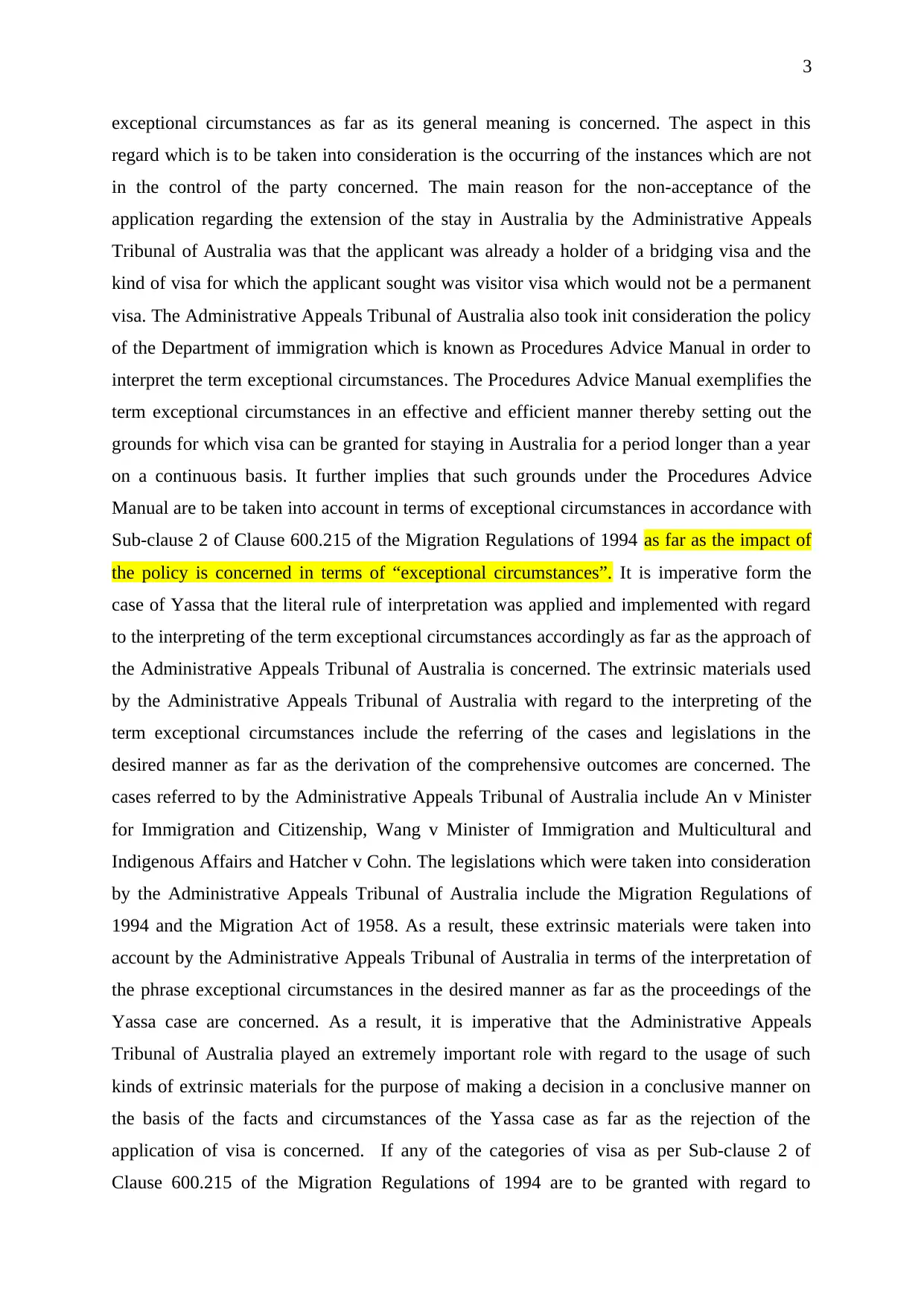
3
exceptional circumstances as far as its general meaning is concerned. The aspect in this
regard which is to be taken into consideration is the occurring of the instances which are not
in the control of the party concerned. The main reason for the non-acceptance of the
application regarding the extension of the stay in Australia by the Administrative Appeals
Tribunal of Australia was that the applicant was already a holder of a bridging visa and the
kind of visa for which the applicant sought was visitor visa which would not be a permanent
visa. The Administrative Appeals Tribunal of Australia also took init consideration the policy
of the Department of immigration which is known as Procedures Advice Manual in order to
interpret the term exceptional circumstances. The Procedures Advice Manual exemplifies the
term exceptional circumstances in an effective and efficient manner thereby setting out the
grounds for which visa can be granted for staying in Australia for a period longer than a year
on a continuous basis. It further implies that such grounds under the Procedures Advice
Manual are to be taken into account in terms of exceptional circumstances in accordance with
Sub-clause 2 of Clause 600.215 of the Migration Regulations of 1994 as far as the impact of
the policy is concerned in terms of “exceptional circumstances”. It is imperative form the
case of Yassa that the literal rule of interpretation was applied and implemented with regard
to the interpreting of the term exceptional circumstances accordingly as far as the approach of
the Administrative Appeals Tribunal of Australia is concerned. The extrinsic materials used
by the Administrative Appeals Tribunal of Australia with regard to the interpreting of the
term exceptional circumstances include the referring of the cases and legislations in the
desired manner as far as the derivation of the comprehensive outcomes are concerned. The
cases referred to by the Administrative Appeals Tribunal of Australia include An v Minister
for Immigration and Citizenship, Wang v Minister of Immigration and Multicultural and
Indigenous Affairs and Hatcher v Cohn. The legislations which were taken into consideration
by the Administrative Appeals Tribunal of Australia include the Migration Regulations of
1994 and the Migration Act of 1958. As a result, these extrinsic materials were taken into
account by the Administrative Appeals Tribunal of Australia in terms of the interpretation of
the phrase exceptional circumstances in the desired manner as far as the proceedings of the
Yassa case are concerned. As a result, it is imperative that the Administrative Appeals
Tribunal of Australia played an extremely important role with regard to the usage of such
kinds of extrinsic materials for the purpose of making a decision in a conclusive manner on
the basis of the facts and circumstances of the Yassa case as far as the rejection of the
application of visa is concerned. If any of the categories of visa as per Sub-clause 2 of
Clause 600.215 of the Migration Regulations of 1994 are to be granted with regard to
exceptional circumstances as far as its general meaning is concerned. The aspect in this
regard which is to be taken into consideration is the occurring of the instances which are not
in the control of the party concerned. The main reason for the non-acceptance of the
application regarding the extension of the stay in Australia by the Administrative Appeals
Tribunal of Australia was that the applicant was already a holder of a bridging visa and the
kind of visa for which the applicant sought was visitor visa which would not be a permanent
visa. The Administrative Appeals Tribunal of Australia also took init consideration the policy
of the Department of immigration which is known as Procedures Advice Manual in order to
interpret the term exceptional circumstances. The Procedures Advice Manual exemplifies the
term exceptional circumstances in an effective and efficient manner thereby setting out the
grounds for which visa can be granted for staying in Australia for a period longer than a year
on a continuous basis. It further implies that such grounds under the Procedures Advice
Manual are to be taken into account in terms of exceptional circumstances in accordance with
Sub-clause 2 of Clause 600.215 of the Migration Regulations of 1994 as far as the impact of
the policy is concerned in terms of “exceptional circumstances”. It is imperative form the
case of Yassa that the literal rule of interpretation was applied and implemented with regard
to the interpreting of the term exceptional circumstances accordingly as far as the approach of
the Administrative Appeals Tribunal of Australia is concerned. The extrinsic materials used
by the Administrative Appeals Tribunal of Australia with regard to the interpreting of the
term exceptional circumstances include the referring of the cases and legislations in the
desired manner as far as the derivation of the comprehensive outcomes are concerned. The
cases referred to by the Administrative Appeals Tribunal of Australia include An v Minister
for Immigration and Citizenship, Wang v Minister of Immigration and Multicultural and
Indigenous Affairs and Hatcher v Cohn. The legislations which were taken into consideration
by the Administrative Appeals Tribunal of Australia include the Migration Regulations of
1994 and the Migration Act of 1958. As a result, these extrinsic materials were taken into
account by the Administrative Appeals Tribunal of Australia in terms of the interpretation of
the phrase exceptional circumstances in the desired manner as far as the proceedings of the
Yassa case are concerned. As a result, it is imperative that the Administrative Appeals
Tribunal of Australia played an extremely important role with regard to the usage of such
kinds of extrinsic materials for the purpose of making a decision in a conclusive manner on
the basis of the facts and circumstances of the Yassa case as far as the rejection of the
application of visa is concerned. If any of the categories of visa as per Sub-clause 2 of
Clause 600.215 of the Migration Regulations of 1994 are to be granted with regard to
⊘ This is a preview!⊘
Do you want full access?
Subscribe today to unlock all pages.

Trusted by 1+ million students worldwide
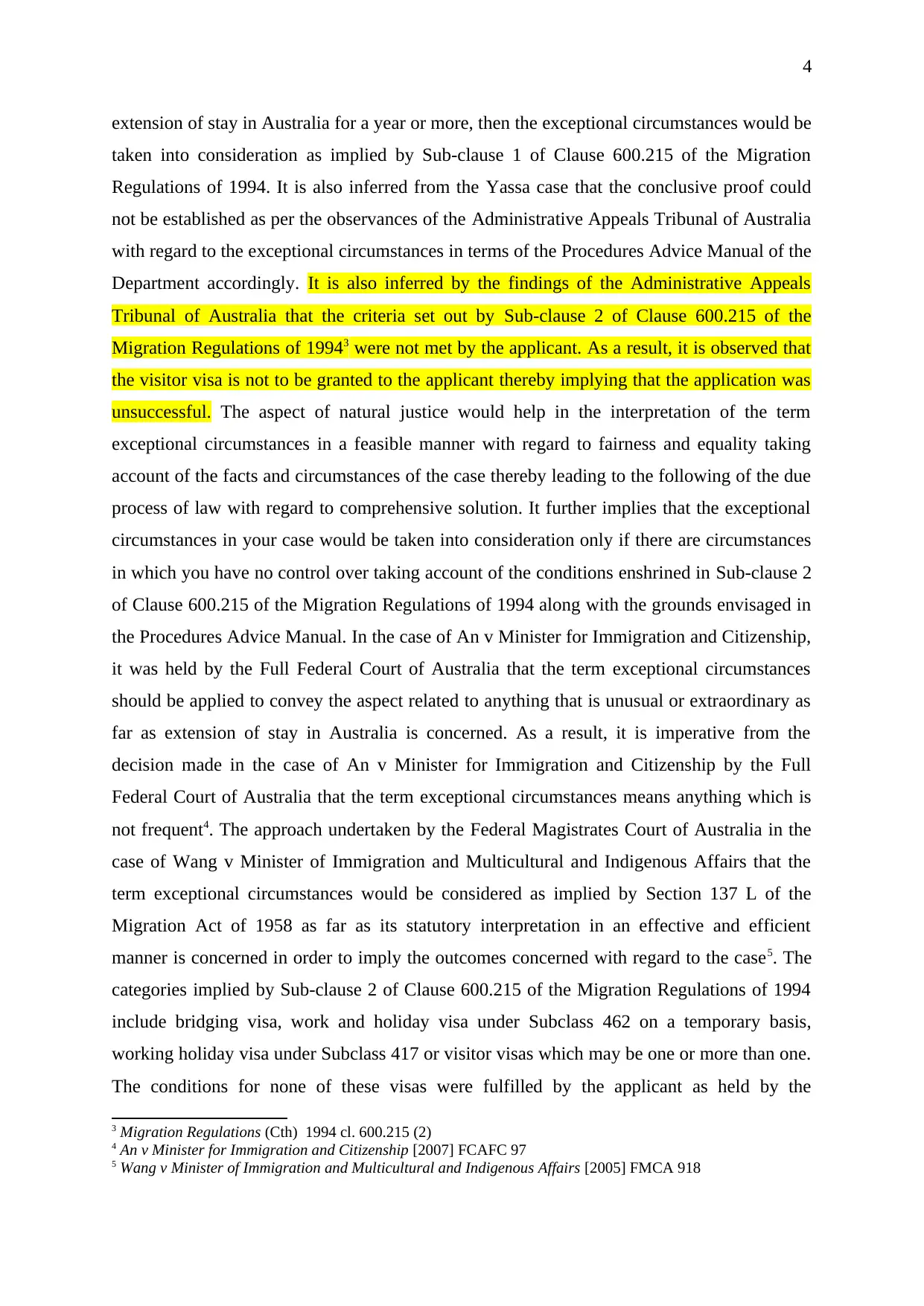
4
extension of stay in Australia for a year or more, then the exceptional circumstances would be
taken into consideration as implied by Sub-clause 1 of Clause 600.215 of the Migration
Regulations of 1994. It is also inferred from the Yassa case that the conclusive proof could
not be established as per the observances of the Administrative Appeals Tribunal of Australia
with regard to the exceptional circumstances in terms of the Procedures Advice Manual of the
Department accordingly. It is also inferred by the findings of the Administrative Appeals
Tribunal of Australia that the criteria set out by Sub-clause 2 of Clause 600.215 of the
Migration Regulations of 19943 were not met by the applicant. As a result, it is observed that
the visitor visa is not to be granted to the applicant thereby implying that the application was
unsuccessful. The aspect of natural justice would help in the interpretation of the term
exceptional circumstances in a feasible manner with regard to fairness and equality taking
account of the facts and circumstances of the case thereby leading to the following of the due
process of law with regard to comprehensive solution. It further implies that the exceptional
circumstances in your case would be taken into consideration only if there are circumstances
in which you have no control over taking account of the conditions enshrined in Sub-clause 2
of Clause 600.215 of the Migration Regulations of 1994 along with the grounds envisaged in
the Procedures Advice Manual. In the case of An v Minister for Immigration and Citizenship,
it was held by the Full Federal Court of Australia that the term exceptional circumstances
should be applied to convey the aspect related to anything that is unusual or extraordinary as
far as extension of stay in Australia is concerned. As a result, it is imperative from the
decision made in the case of An v Minister for Immigration and Citizenship by the Full
Federal Court of Australia that the term exceptional circumstances means anything which is
not frequent4. The approach undertaken by the Federal Magistrates Court of Australia in the
case of Wang v Minister of Immigration and Multicultural and Indigenous Affairs that the
term exceptional circumstances would be considered as implied by Section 137 L of the
Migration Act of 1958 as far as its statutory interpretation in an effective and efficient
manner is concerned in order to imply the outcomes concerned with regard to the case5. The
categories implied by Sub-clause 2 of Clause 600.215 of the Migration Regulations of 1994
include bridging visa, work and holiday visa under Subclass 462 on a temporary basis,
working holiday visa under Subclass 417 or visitor visas which may be one or more than one.
The conditions for none of these visas were fulfilled by the applicant as held by the
3 Migration Regulations (Cth) 1994 cl. 600.215 (2)
4 An v Minister for Immigration and Citizenship [2007] FCAFC 97
5 Wang v Minister of Immigration and Multicultural and Indigenous Affairs [2005] FMCA 918
extension of stay in Australia for a year or more, then the exceptional circumstances would be
taken into consideration as implied by Sub-clause 1 of Clause 600.215 of the Migration
Regulations of 1994. It is also inferred from the Yassa case that the conclusive proof could
not be established as per the observances of the Administrative Appeals Tribunal of Australia
with regard to the exceptional circumstances in terms of the Procedures Advice Manual of the
Department accordingly. It is also inferred by the findings of the Administrative Appeals
Tribunal of Australia that the criteria set out by Sub-clause 2 of Clause 600.215 of the
Migration Regulations of 19943 were not met by the applicant. As a result, it is observed that
the visitor visa is not to be granted to the applicant thereby implying that the application was
unsuccessful. The aspect of natural justice would help in the interpretation of the term
exceptional circumstances in a feasible manner with regard to fairness and equality taking
account of the facts and circumstances of the case thereby leading to the following of the due
process of law with regard to comprehensive solution. It further implies that the exceptional
circumstances in your case would be taken into consideration only if there are circumstances
in which you have no control over taking account of the conditions enshrined in Sub-clause 2
of Clause 600.215 of the Migration Regulations of 1994 along with the grounds envisaged in
the Procedures Advice Manual. In the case of An v Minister for Immigration and Citizenship,
it was held by the Full Federal Court of Australia that the term exceptional circumstances
should be applied to convey the aspect related to anything that is unusual or extraordinary as
far as extension of stay in Australia is concerned. As a result, it is imperative from the
decision made in the case of An v Minister for Immigration and Citizenship by the Full
Federal Court of Australia that the term exceptional circumstances means anything which is
not frequent4. The approach undertaken by the Federal Magistrates Court of Australia in the
case of Wang v Minister of Immigration and Multicultural and Indigenous Affairs that the
term exceptional circumstances would be considered as implied by Section 137 L of the
Migration Act of 1958 as far as its statutory interpretation in an effective and efficient
manner is concerned in order to imply the outcomes concerned with regard to the case5. The
categories implied by Sub-clause 2 of Clause 600.215 of the Migration Regulations of 1994
include bridging visa, work and holiday visa under Subclass 462 on a temporary basis,
working holiday visa under Subclass 417 or visitor visas which may be one or more than one.
The conditions for none of these visas were fulfilled by the applicant as held by the
3 Migration Regulations (Cth) 1994 cl. 600.215 (2)
4 An v Minister for Immigration and Citizenship [2007] FCAFC 97
5 Wang v Minister of Immigration and Multicultural and Indigenous Affairs [2005] FMCA 918
Paraphrase This Document
Need a fresh take? Get an instant paraphrase of this document with our AI Paraphraser
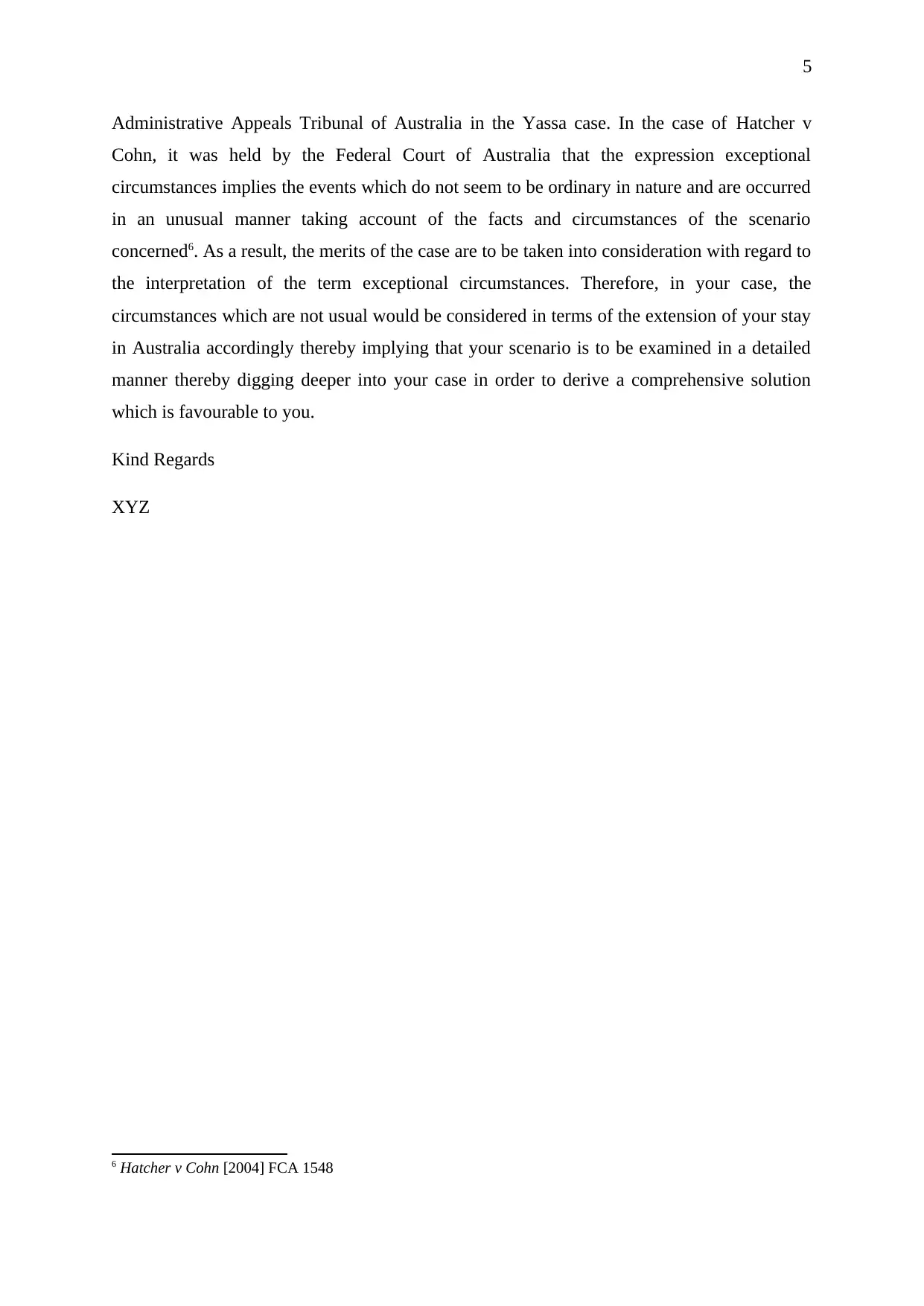
5
Administrative Appeals Tribunal of Australia in the Yassa case. In the case of Hatcher v
Cohn, it was held by the Federal Court of Australia that the expression exceptional
circumstances implies the events which do not seem to be ordinary in nature and are occurred
in an unusual manner taking account of the facts and circumstances of the scenario
concerned6. As a result, the merits of the case are to be taken into consideration with regard to
the interpretation of the term exceptional circumstances. Therefore, in your case, the
circumstances which are not usual would be considered in terms of the extension of your stay
in Australia accordingly thereby implying that your scenario is to be examined in a detailed
manner thereby digging deeper into your case in order to derive a comprehensive solution
which is favourable to you.
Kind Regards
XYZ
6 Hatcher v Cohn [2004] FCA 1548
Administrative Appeals Tribunal of Australia in the Yassa case. In the case of Hatcher v
Cohn, it was held by the Federal Court of Australia that the expression exceptional
circumstances implies the events which do not seem to be ordinary in nature and are occurred
in an unusual manner taking account of the facts and circumstances of the scenario
concerned6. As a result, the merits of the case are to be taken into consideration with regard to
the interpretation of the term exceptional circumstances. Therefore, in your case, the
circumstances which are not usual would be considered in terms of the extension of your stay
in Australia accordingly thereby implying that your scenario is to be examined in a detailed
manner thereby digging deeper into your case in order to derive a comprehensive solution
which is favourable to you.
Kind Regards
XYZ
6 Hatcher v Cohn [2004] FCA 1548
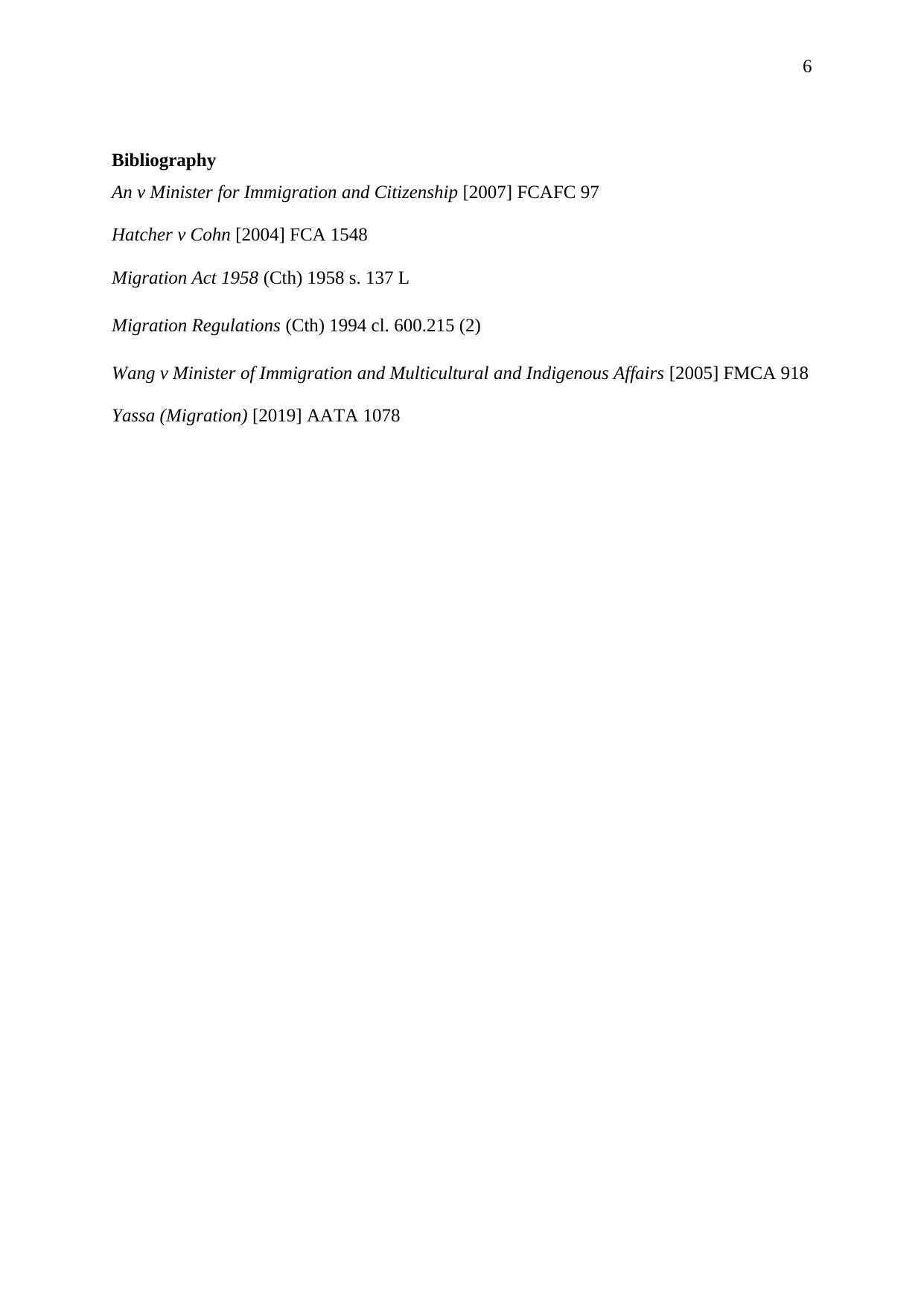
6
Bibliography
An v Minister for Immigration and Citizenship [2007] FCAFC 97
Hatcher v Cohn [2004] FCA 1548
Migration Act 1958 (Cth) 1958 s. 137 L
Migration Regulations (Cth) 1994 cl. 600.215 (2)
Wang v Minister of Immigration and Multicultural and Indigenous Affairs [2005] FMCA 918
Yassa (Migration) [2019] AATA 1078
Bibliography
An v Minister for Immigration and Citizenship [2007] FCAFC 97
Hatcher v Cohn [2004] FCA 1548
Migration Act 1958 (Cth) 1958 s. 137 L
Migration Regulations (Cth) 1994 cl. 600.215 (2)
Wang v Minister of Immigration and Multicultural and Indigenous Affairs [2005] FMCA 918
Yassa (Migration) [2019] AATA 1078
⊘ This is a preview!⊘
Do you want full access?
Subscribe today to unlock all pages.

Trusted by 1+ million students worldwide
1 out of 6
Related Documents
Your All-in-One AI-Powered Toolkit for Academic Success.
+13062052269
info@desklib.com
Available 24*7 on WhatsApp / Email
![[object Object]](/_next/static/media/star-bottom.7253800d.svg)
Unlock your academic potential
Copyright © 2020–2026 A2Z Services. All Rights Reserved. Developed and managed by ZUCOL.





